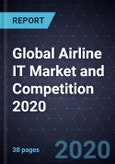A Benchmarking System to Spark Companies to Action - Innovation That Fuels New Deal Flow and Growth Pipelines
This airline IT market report discusses the major companies, the role of OEMs and big tech firms, and key disruptors in the market.
The airline information technology (IT) market is a highly fragmented one with numerous start-ups and conglomerates offering various airline IT solutions across geographies. The leading companies in this market have distinguished their products and services from the rest of the market by maintaining a long-term focus in their R&D investment strategy, by developing next-generation technological capabilities, by bundling and upselling solutions, and by developing cross-industry synergies.
COVID-19 has changed the digital priorities of airlines worldwide. The key focus is now on implementing contactless technologies, optimizing airline operations, improving merchandising efforts, and optimizing pricing and network planning.
As every facet of aviation is being digitized, there is a higher requirement for stakeholder collaboration that will enable an easy flow of data. A big-data-enabled platform is one such solution where multiple stakeholders of the aviation industry, such as airlines, MROs, and OEMs share data that will enable them to optimize their operations. Such operational data platforms are the key focus areas of major OEMs, which will mature over the long term and play a critical role in the operational IT segment of the market.
This focus has led to intense competition in the operational IT segment, as OEMs are developing their own portfolio of digital solutions and have the competitive advantage of proprietary data. Airlines and solution providers will need to partner with leading technology firms, such as Google, Amazon, IBM, Microsoft, which are at the forefront of the digital revolution. Such partnerships will enable them to explore the latest technological developments, identify pain points in the industry which the new technology can address, and apply it to their solutions.
With airlines adopting cloud computing, digital firms have become a part of the airline IT ecosystem and are set to gain more prominence over the long term. Though they now serve as key technology partners for airline IT solution providers, they will soon become competitors as they extend their solution capabilities.
Deep technical knowledge and cross-industry expertise of Big Tech firms will make the airline IT market a highly competitive one over the long term. The rise of interconnected solutions has created a vulnerable data ecosystem, so regulatory policies now mandate various technological security measures to protect an individual’s data privacy, failing which airlines would face financial penalties and consequent brand implications. This has increased the focus on cybersecurity solutions, such as identity and access control solutions and data loss prevention solutions.
Table of Contents
1. Strategic Imperative and Growth Environment
- Strategic Imperative
- Growth Environment
2. The Radar
- The Radar: Global Airline IT Market
- The Radar: Competitive Environment
3. Companies to Action
- Amadeus
- Sabre
- SITA
- TravelSky
- Lufthansa Systems
- IBS Software
- Boeing Digital Solutions
- PROS
- Airbus
- IBM
- GE Aviation
- Collins Aerospace
- Honeywell Aerospace
- Accelya
- Boxever
4. Strategic Insights
5. Next Steps: Leveraging The Radar to Empower Key Stakeholders
- Significance of Being on The Radar
- The Radar Empowers the CEO’s Growth Team
- The Radar Empowers Investors
- The Radar Empowers Customers
- The Radar Empowers the Board of Directors
6. Radar Analytics
- The Radar: Benchmarking Future Growth Potential
Companies Mentioned (Partial List)
A selection of companies mentioned in this report includes, but is not limited to:
- Accelya
- Airbus
- Amadeus
- Amazon
- Boeing Digital Solutions
- Boxever
- Collins Aerospace
- GE Aviation
- Honeywell Aerospace
- IBM
- IBS Software
- Lufthansa Systems
- Microsoft
- PROS
- Sabre
- SITA
- TravelSky









